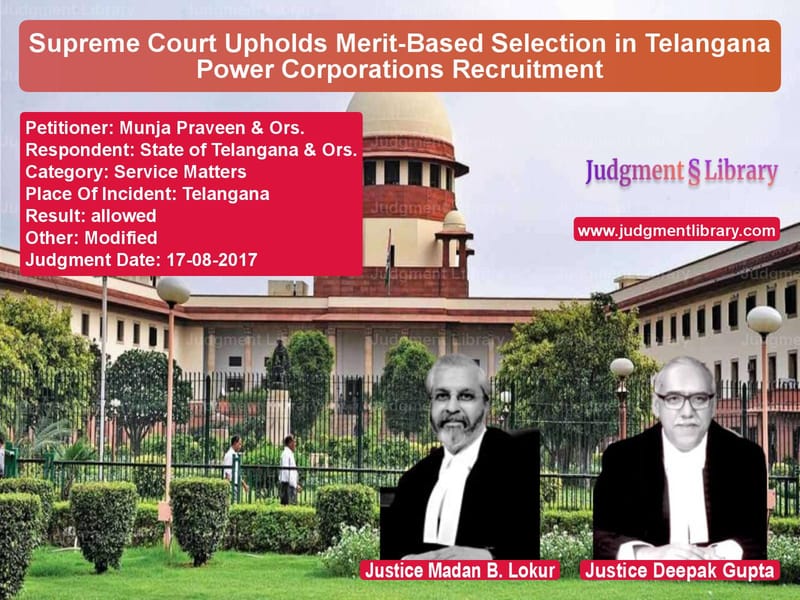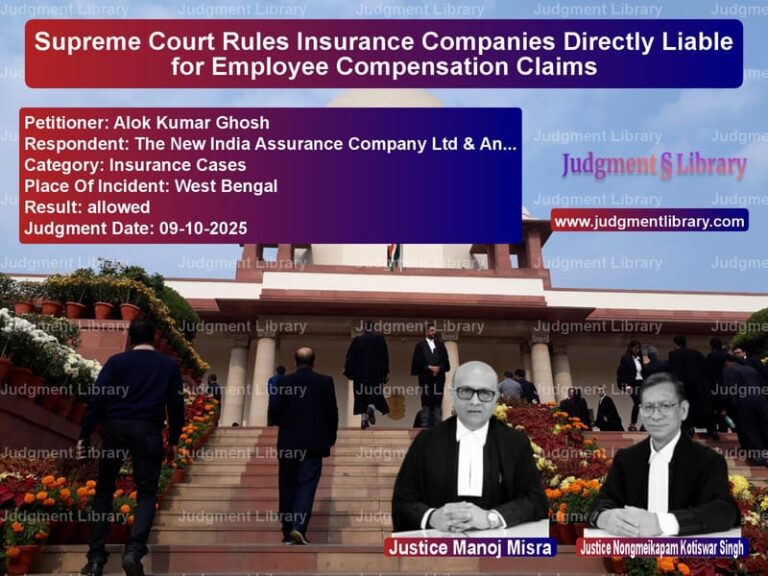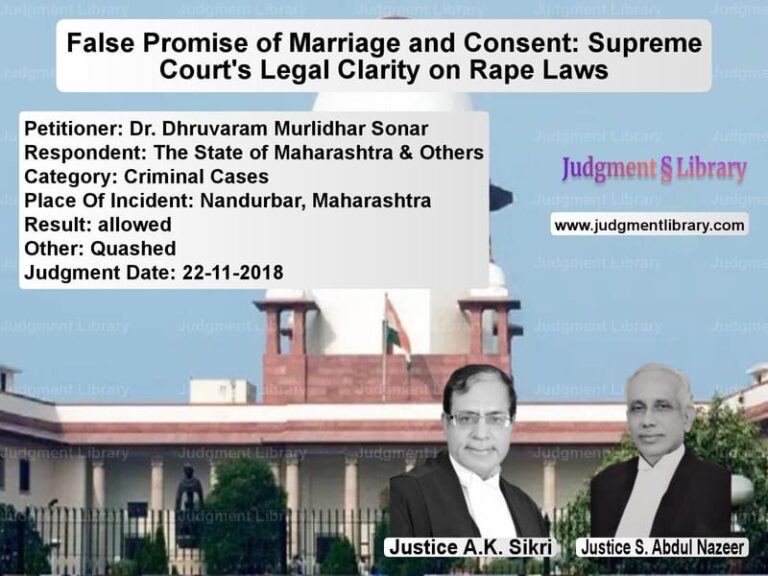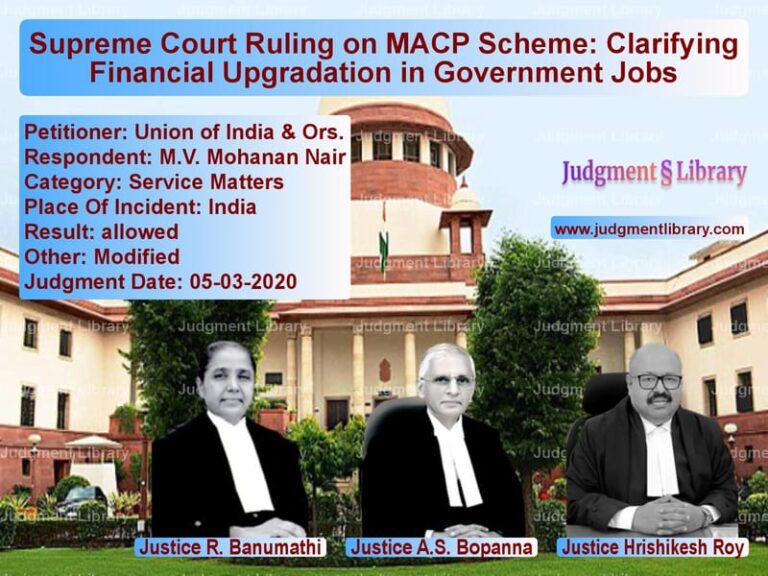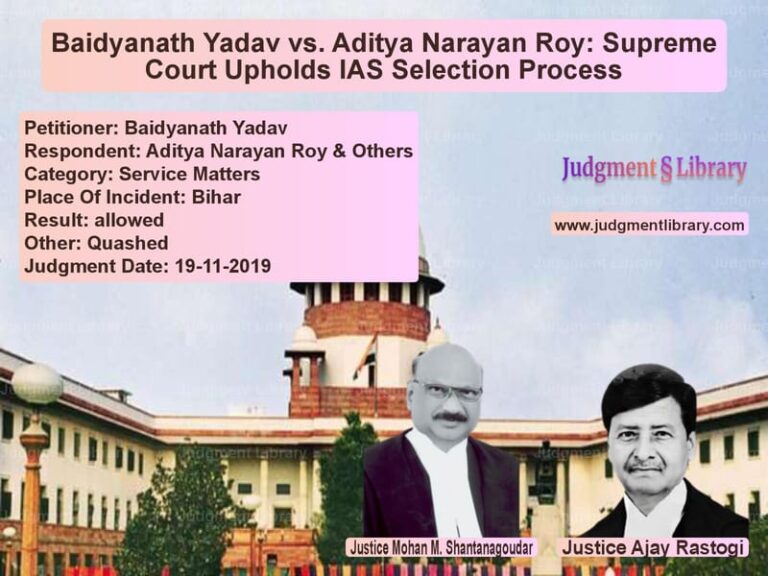Supreme Court Upholds Merit-Based Selection in Telangana Power Corporations Recruitment
The case of Munja Praveen & Ors. vs. State of Telangana & Ors. revolves around the recruitment process for Assistant Engineer (Electrical) and Assistant Engineer (Civil) positions in various Telangana power corporations. The Supreme Court was called upon to determine whether the state government and corporations were justified in filling vacant positions by moving down the merit list despite an earlier notification stating there would be no waiting list.
Background of the Case
Several power corporations in Telangana—TSTRANSCO, TSNPDCL, TSSPDCL, and TSGENCO—issued advertisements inviting applications for the posts of Assistant Engineers in their respective organizations. The selection process was based solely on a written examination, and the advertisements clearly stated that there would be no waiting list.
After the results were announced, many candidates who were selected in multiple corporations chose one position over the others, leaving several vacancies unfilled. To address this issue, the Telangana government issued a clarification allowing the corporations to fill the unoccupied posts by moving down the merit list.
Aggrieved by this decision, certain candidates approached the Telangana High Court, arguing that the government’s clarification violated the recruitment notification’s explicit statement that no waiting list would be maintained. The High Court ruled in favor of the petitioners, striking down the government’s directive and holding that the vacancies should be filled in subsequent selection processes.
The candidates who would have benefited from the downward extension of the merit list appealed to the Supreme Court.
Legal Issues
The Supreme Court examined the following legal issues:
- Whether the state government’s clarification allowing corporations to operate the merit list downwards was valid.
- Whether the explicit statement in the recruitment notification that there would be “no waiting list” prevented the corporations from filling unoccupied positions.
- Whether the High Court misinterpreted the applicable government order (G.O.Ms. No. 81) governing the recruitment process.
Arguments by the Petitioners (Munja Praveen & Ors.)
The petitioners, represented by their counsel, contended:
- The High Court misinterpreted G.O.Ms. No. 81, which was meant to prevent the use of waiting lists in future recruitment processes but did not prohibit the adjustment of the existing merit list before issuing appointment letters.
- The recruitment process had not reached its final stage because appointment orders had not yet been issued, meaning that moving down the merit list was permissible.
- Refusing to fill vacancies from the merit list would be arbitrary and would result in avoidable delays in public service recruitment.
- The decision of the High Court benefited lower-merit candidates while disadvantaging more qualified candidates.
Arguments by the Respondent (State of Telangana & Ors.)
The respondents countered:
- The recruitment notification explicitly stated that no waiting list would be maintained, and the corporations should abide by the terms of their own notification.
- The government’s clarification amounted to a post-facto amendment of the recruitment terms, which was unfair to candidates who had relied on the original notification.
- Any vacancies left unfilled due to non-joining of selected candidates should be carried forward to the next recruitment cycle rather than adjusted within the same recruitment.
Supreme Court Judgment
The Supreme Court ruled in favor of the petitioners and set aside the High Court’s judgment. The key observations made by the Court were:
- The government’s clarification allowing corporations to fill unoccupied positions from the merit list was in line with the recruitment process and was not an arbitrary decision.
- G.O.Ms. No. 81 was meant to prevent the use of waiting lists in future recruitments but did not bar corporations from filling vacancies from the merit list before issuing appointment letters.
- The notification’s “no waiting list” clause did not apply to cases where candidates declined offers before appointment letters were issued, as this did not constitute relinquishment after joining.
- Ensuring that the most meritorious candidates were selected for the available vacancies was in the public interest.
Observations of the Supreme Court
The Court stated:
“The recruitment process reaches finality only upon the issuance of appointment orders. Until that stage, the corporations were justified in filling unoccupied posts from the existing merit list rather than allowing vacancies to persist.”
Additionally, the Court ruled:
“An interpretation that leads to public service positions remaining unfilled despite the availability of qualified candidates cannot be countenanced. The clarification issued by the State was neither arbitrary nor ultra vires.”
Conclusion
The Supreme Court’s ruling emphasizes the importance of fair and merit-based recruitment while ensuring that procedural technicalities do not hinder efficient public administration. The judgment highlights:
- The need for a pragmatic approach in handling recruitment vacancies.
- The importance of interpreting recruitment rules in a manner that serves the larger public interest.
- The role of courts in preventing unnecessary litigation that could delay the hiring process.
This decision sets a vital precedent for recruitment processes in government bodies, ensuring that vacancies are filled efficiently and fairly, while balancing the rights of all candidates.
Don’t miss out on the full details! Download the complete judgment in PDF format below and gain valuable insights instantly!
Download Judgment: Munja Praveen & Ors. vs State of Telangana & Supreme Court of India Judgment Dated 17-08-2017.pdf
Direct Downlaod Judgment: Direct downlaod this Judgment
See all petitions in Recruitment Policies
See all petitions in Public Sector Employees
See all petitions in Promotion Cases
See all petitions in Judgment by Madan B. Lokur
See all petitions in Judgment by Deepak Gupta
See all petitions in allowed
See all petitions in Modified
See all petitions in supreme court of India judgments August 2017
See all petitions in 2017 judgments
See all posts in Service Matters Category
See all allowed petitions in Service Matters Category
See all Dismissed petitions in Service Matters Category
See all partially allowed petitions in Service Matters Category

